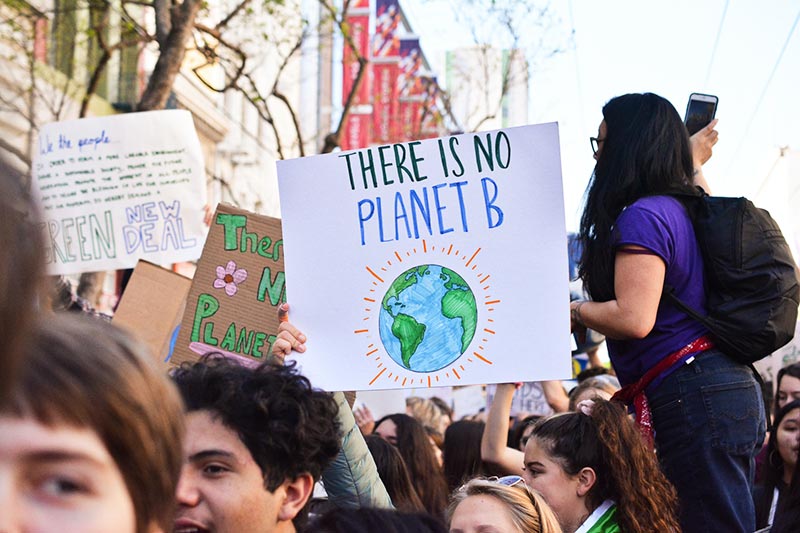What is meant by the rebound effect in the context of sustainability? Wenn du eine Antwort auf diese Frage suchst, bist du hier genau richtig. Immer wieder hört man mal, dass „der technologische Fortschritt uns schon retten wird“ oder dass die „Technik schon sehr bald so weit sei“ als Ausreden dafür, gar nicht erst zu versuchen, live more sustainably.
Doch hilft uns die stetige, technische Weiterentwicklung mit Energiesparlampen und immer verbrauchsärmeren Autos wirklich aus der Patsche? Oder sorgt der Glaube daran, dass die Technik es schon richten wird dafür, dass sich die Environmental problems of our time nur immer weiter verschärfen?
Solche Gedanken sind absolut berechtigt: Denn auch, wenn wir energiesparsamere Technologien entwickeln, wird unser Alltag ja dennoch immer energieintensiver.
In diesem Artikel möchte ich dir jetzt zeigen, warum man dieses psychologische Phänomen als „Rebound-Effekt“ bezeichnet und inwiefern er eine Rolle für Umweltökonomie und Nachhaltigkeit spielt. Außerdem gehe ich darauf ein, wie er sich verhindern oder eingrenzen lässt. Auf geht's!
Hier ist schon eine kurze Übersicht über den Artikel für dich:
What is the rebound effect?
Der Rebound-Effekt (auch Rückschlageffekt oder Bumerang-Effekt genannt) bezeichnet in der Umweltökonomie das psychologische Phänomen, dass das Einsparpotenzial von Effizienzsteigerungen nicht oder nur teilweise verwirklicht wird.
Grund dafür ist vor allem das veränderte Nutzungsverhalten in Folge der höheren Energieeffizienz. Die Menschen verbrauchen schlussendlich mehr Energie als vorher, wodurch sich die ursprünglichen Einsparungen wieder (ganz oder teilweise) aufheben.
Dieser Effekt ist real und definitiv bei politischen Entscheidungen zu berücksichtigen! Denn am Ende verbraucht man durch den Rebound-Effekt mehr Energie, als ohne die Energieeffizienzpolitik.
Das Ignorieren des psychologischen Phänomens hätte also eine beschleunigende Wirkung auf die global warming – und das ist das Gegenteil von dem, worauf eine Energieeffizienzpolitik abzielt.
Direct rebound effect: Demand for a product increases because it can be offered at a lower price due to higher energy efficiency.
Example: energy-saving lamp instead of conventional light bulb. Energy-saving lamps reduce energy costs and are often left on longer precisely because of their lower power consumption. As a result, the energy savings are significantly lower than expected.
Indirect rebound effect: Verbraucher:innen geben die eingesparten Energiekosten für andere energieintensive Aktivitäten aus.
Beispiel: Eine Familie investiert in eine energieeffiziente Küche. Von den eingesparten Energiekosten gönnt sie sich eine Flugreise ans andere Ende der Welt.
What does the rebound effect mean in the context of sustainability and environmental protection?
Das Ziel der Steigerung der Energieeffizienz eines Produktes ist es, dass es am Ende weniger Energie verbraucht – um Energiekosten einzusparen und die Umwelt zu schonen.
In der Realität ist jedoch zu beobachten, dass die better energy efficiency also results in higher energy consumption. Das ist der Rebound-Effekt – und sein Zusammenhang mit Ökonomie und Ökologie lässt sich wunderbar an zwei Beispielen erläutern, die die Ökonomin Maja Göpel in ihrem Book "Rethinking Our World (is available here*) beschrieben hat.
Explained using the example of the VW Beetle
Mitte der Fünfziger verbrauchte ein VW Käfer noch etwa 7,5 Liter Benzin auf 100 Kilometer. Ende der 90er, als er der weiterentwickelte VW Beatle auf den Markt kam, verbrauchte er fast genau so viel Benzin – trotz der 40 Jahre technischen Fortschritts, die dazwischen lagen. Merkwürdig, oder?
Doch wer einen Vergleich wagt, erkennt, dass der VW Beatle seinen PS value tripled, its maximum speed increased from 110 km/h to 160 km/h and its Weight increased by almost half a ton has.₂
The further development of the VW Beetle shows in an amazing way that the lower consumption exchanged for more power instead of preserving the environmental benefit. An action that is representative of our current way of doing business.
Am Beispiel der Glühbirne erklärt
Ende des 19. Jahrhunderts fand die Glühbirne zunächst den Weg in die Haushalte wohlhabenderer Menschen. Damals wurde die meiste Energie noch in Wärme und nur ein geringer Teil in Licht umgewandelt. Gegenüber Gaslampen war sie jedoch damals schon ein echter Fortschritt.
Im Laufe der Zeit ersetzte man den glühenden Kohlefaden durch einen Wolfram-Faden, der deutlich länger und viel heller leuchtete. Die Glühbirne benötigte nur noch ein Viertel des Stroms und wurde also effizienter. Stromversorger:innen hatten Angst, dass ihr Geschäft mit dem geringeren Energieverbrauch der Haushalte einbricht.
How can the rebound effect be prevented or contained?

Der Rebound-Effekt ist also ein massives Problem auf dem Weg in eine nachhaltigere Lebensweise mit einem deutlich geringeren Verbrauch natural resources.
It is clear that each and every one of us has to take care of our own Reduce ecological footprint must. Angst davor, zukünftig auf „alles verzichten“ zu müssen, muss aber niemand haben. Auch mit deutlich lower resource consumption lässt sich nämlich ein ebenso glückliches Leben führen.
The Bemühen um einen möglichst geringen Rohstoff- und Energieverbrauch bezeichnet man übrigens als Sufficiency. But we can, of course, do more than just sweep in front of our own front door.
It also helps, Putting pressure on politics. Zum Beispiel durch die Teilnahme an Demonstrationen oder Self-started or supported online petitions.
Maja Göpel erklärt in ihrem Buch „Unsere Welt neu denken“* zum Beispiel, dass die Politik u. a. durch eine CO2 tax dafür sorgen kann, dass die durch eine Effizienzsteigerung nun verbilligte Energiedienstleistung teurer wird, damit Menschen wieder bewusster und sparsamer damit umgehen.
Ebenso ließen sich Umweltprobleme wie der Klimawandel entschleunigen, indem CO2 emissions to be capped with political measures or they are to be reduced by a certain date.
Let's not misunderstand each other: Technischer Fortschritt ist etwas Großartiges und kann auch für mehr Sustainability in unserer Lebensweise sorgen. Doch dafür muss er darauf ausgerichtet werden, das Bruttoinlandsprodukt wachsen zu lassen, ohne dafür die Natur auszubeuten. Da ökologische Folgen bisher weitestgehend ignoriert wurden, haben wir selbst für die größten Umweltprobleme unserer Zeit gesorgt.
Der Rebound-Effekt: Ein gefährliches, psychologisches Phänomen!
Unsere Technologien werden zwar immer effizienter, doch eine Absolute decoupling of economic growth and resource consumption does not take place. Im Gegenteil, der Ressourcenverbrauch steigt und wird weiter zunehmen.
A Veränderung unserer Lebensweise ist unausweichlich. Jeder von uns kann und muss seinen Teil leisten. Und das geht auch, ohne den „Gürtel enger schnallen zu müssen“.
The rebound effect is thus both a phenomenon and a problem. Doch anstatt Angst vor der Veränderung und vor hohen Preisen zu haben, sollten wir uns lieber darauf fokussieren, dass es grundsätzlich finanziell rentabel ist, den eigenen Ressourenverbrauch zu reduzieren.
Am Ende profitieren alle davon – nicht zuletzt die eigenen Kinder, Enkelkinder und alle zukünftigen Generationen – wenn wir den Rebound-Effekt ernst nehmen und bei politischen sowie wirtschaftlichen Entscheidungen berücksichtigen.
"We are living in dangerous times. Men control nature before they are even able to control themselves."
Albert Schweitzer (more at Environmental protection quotes)
Hast du Fragen oder Anregungen zu diesem Phänomen aus der Umweltökonomie? Dann schreib mir gern einen Kommentar!
Stay sustainable,

PS: Schau dich gern noch ein bisschen mehr im Environmental Knowledge Blog around! Learn, for example, what is meant by sustainability in the context of the Externalization of Environmental Costs understands.
References:
₁,₂ Maja Göpel: Unsere Welt neu denken - Eine Einladung, Ullstein Verlag, Berlin, 12th edition 2020, pp. 98 - 105.









